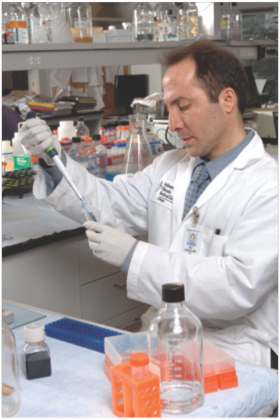We recently sat down with Dr. Ali Djalilian from the University of Illinois at Chicago. With funding provided by Vision For Tomorrow, Djalilian is studying the use of Mesenchymal Stem Cells for Aniridic Keratopathy. The vision for this research is to provide an alternate and less invasive treatment option to preserve corneal health in patients with aniridia.

VFT: What made you focus on ocular research?
Dr. Djalilian: I like science. I have a desire to find creative solutions to problems and I can do that through research. The eye fascinates me. As a structure, it has so much going on in it and there is so much science behind it. The eye plays a major role in how we function and can be so critical to our quality of life.
VFT: Can you tell us about your latest research?
Dr. Djalilian: I’m interested in the cornea and the surface cells. The cornea is one of the structures affected in aniridia over time due to limbal stem cell deficiency. A patient may start with a good-looking cornea but over time they can lose cells. There must be something we can do to keep these cells alive longer and functioning well.
Based on my work and the work of others, we know we can improve the environment in which these limbal stem cells live. We need to look at the neighborhood around these cells and improve it. This neighborhood is called a niche. We are trying to improve the niche in aniridia by using mesenchymal stem cells which are known to have regenerative and healing properties.
The idea is that by improving the neighborhood in which the limbal stem cells live, these cells can live longer and happier lives. We will be able to add something into the neighborhood to improve the environment versus wiping out the whole neighborhood and transplanting a new one, which comes with more risks.
My hope is this could be a real treatment option in the clinical setting in five to six years. Patients could use drops to maintain or improve the limbal stem cell function, thus preserving the state of the cornea.
VFT: What is your vision for tomorrow?
Dr. Djalilian: My vision is to have treatments in place that we can use to preserve the limbal stem cell function for the patient’s lifetime in a way that avoids transplants and other more risky treatments. In addition, I’d like to be able to help those that have lost their limbal cell function altogether by finding safer and less invasive ways to treat and restore the cornea. Ultimately, I’d like patients to keep the vision they were born with for their whole life. My hope is we will be able to stop the things that can take it away over time.
Ali Djalilian M.D. is an Associate Professor of Ophthalmology and Adjunct Associate Professor of Bio-Engineering in the Department of Ophthalmology & Visual Sciences at the University of Illinois Eye and Ear Infirmary at the University of Illinois at Chicago. He conducted epithelial cell biology research training at the National Human Genome Research Institute at the National Institute of Health. Dr. Djalilian’s clinical fellowships include studying cornea and ocular surface disorders with Edward Holland, M.D. at the Cincinnati Eye Institute and ocular immunology and uveitis with Robert Nussenblatt M.D., M.P.H. at the National Eye Institute.




